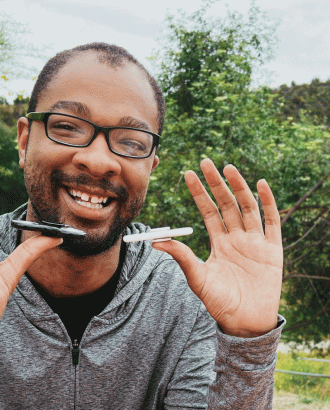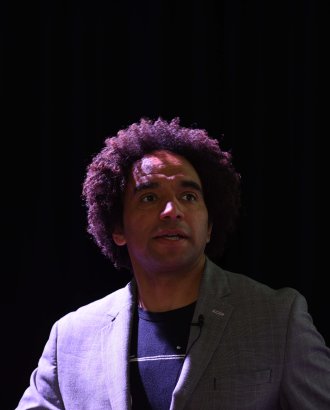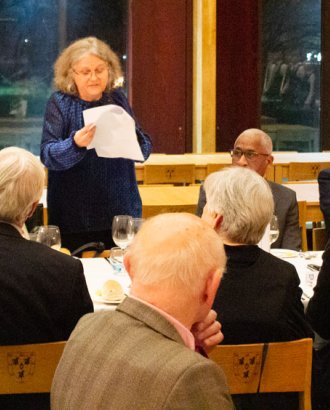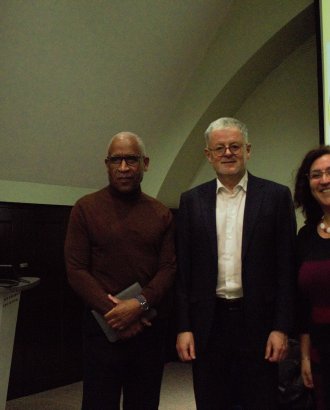On 21 April, Homerton Fellow Professor Mary Dixon-Woods became an Honorary Fellow of the Royal College of Obstetricians and Gynaecologists, expanding an already impressive haul of honours. In addition to her roles as Director of The Healthcare Improvement Studies Institute (THIS Institute) and Professorial Fellow at Homerton, Mary is a Fellow of the Academy of Social Sciences, Fellow of the Academy of Medical Sciences, Honorary Fellow of the Royal College of Physicians and Honorary Fellow of the Royal College of General Practitioners. She gave the Harveian Oration at the Royal College of Physicians in 2018, the 500th anniversary of the college’s founding.
The breadth of this recognition reflects the widespread impact of THIS Institute, which was launched in January 2018 with a remit to improve healthcare through research.
“Until relatively recently, there was a strong heritage-driven approach to medical care, with knowledge handed on through the generations in a kind of apprenticeship model,” Mary explains. “But over a 50 year period we saw the emergence of a social movement and an infrastructure to support the principle that treatments should be based on high quality evidence rather than personal opinion or preference. We can see the benefits of this every day, for example during the pandemic."
It’s only more recently, Mary explains, “that there has been the dawning realisation that there also needs to be science behind how we organise and deliver care as much as for treatment, and that if we’re going to improve quality and safety of care then it needs an evidence base too.”
In June 2016, just a month after Mary had arrived in Cambridge as the RAND Professor of Health Services Research, bids were sought by the Health Foundation for the development of a new research institute to fill this gap. She bid for it and following several rounds of a “very demanding process”, was successfully granted funding of £42.5 million in March 2017. THIS Institute was launched ten months later in January 2018. It’s had a close affiliation with Homerton, where Mary had become a Fellow in 2016, from the beginning.
“When (former Principal) Geoff Ward approached me about a fellowship I was thrilled – Homerton was top of my list,” she says. “I was so impressed by its vision and boldness and how it had stepped forward in this incredibly bold way. It remains the top College I would want to be associated with. You can’t have an uninteresting conversation here!”
THIS Institute works directly with patients and NHS staff, as well as with collaborators from many different organisations and disciplines, to produce scientifically rigorous evidence to support healthcare improvement. It funds a national research fellowship scheme that has made awards to 18 universities to date, supporting a new generation of people with the skills and capability to study improvement. The fellows come from disciplines ranging from engineering to social science and from law to statistics, but are united by their commitment to generating evidence to improve care. The postgraduate fellows take part in a research leadership programme that meets at Homerton (or online, during the pandemic).
A distinctive feature of THIS Institute is its development of the highly innovative online research and engagement platform, THIScovery. Underpinned by a highly participatory ethos, Thiscovery brings together people who have questions and people who can build the evidence for answers – most importantly NHS patients and staff. It’s hosted over 30 projects so far, engaging over 5000 people in rewarding and valuable activities. Another important feature of THIS is its commitment to inclusion, diversity and equality. It works with a range of charities, community groups and civic society organisations to ensure that under-served groups are represented and listened to.
A current project focusing on avoiding brain injury in childbirth was commissioned by the Department of Health and Social Care, in collaboration with the Royal College of Obstetricians and Gynaecologists, and the Royal College of Midwives. It brings together the perspectives of maternity services staff and maternity service users to improve detection of possible foetal deterioration during labour and to support management of an obstetric emergency known as impacted foetal head at caesarean section.
“These new approaches are intended to make care safer, and because they have been co-designed with the people involved, we can be confident that they address the things that matter to them.”
Mary grew up in Ireland and initially studied communications at Dublin City University and statistics at Trinity College Dublin. She spent four years working on energy policy as a civil servant, before moving to the UK to complete an MA in social policy at Oxford, which led to a DPhil in health research. Before her move to Cambridge, she spent 22 years at the University of Leicester.
The Honorary Fellowship was conferred on 21 April, and reflects Mary’s commitment to improving obstetric care and women’s healthcare more broadly.
“It’s a great honour,” she says. “I’m really thrilled.”




